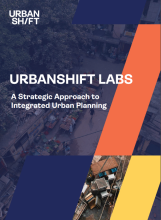Eillie Anzilotti is Communications Lead for UrbanShift, a WRI Ross Center for Sustainable Cities program supporting sustainable and inclusive urban development across 23 cities in the global South. She manages the program's communications strategy, storytelling efforts and social media platforms.
Prior to joining WRI, Eillie managed communications and public relations for the San Francisco Municipal Transportation Agency’s Livable Streets subdivision, where she worked on high-profile, transformative street design initiatives like Slow Streets and establishing a car-free promenade through Golden Gate Park. Before that, she covered urbanism, social justice, and sustainability as a writer and editor for publications including Fast Company and CityLab.
Eillie holds a master's degree in English Literature from the University of Oxford, and a B.S. in English Literature and Creative Writing from the University of Pennsylvania. She lives with her husband in Oakland, California, where she enjoys exploring by bike and advocating for more walkable, livable neighborhoods.
Latest by Eillie Anzilotti

UrbanShift Labs
Summarizing insights and lessons from eight of UrbanShift's Labs, this report offers a template for furthering geospatial analysis in cities.

Meet CityMetrics: An Open-Source, Interactive Tool for Analyzing Urban Risks and Opportunities
With CityMetrics, a new geospatial data platform developed by WRI, over 60 cities--including all 23 UrbanShift cities--can access in-depth data on urban risks and vulnerabilities.

Visions of Sustainability in Mar del Plata and Mar Chiquita
Along the coast of Argentina, two ambitious plans are showing how participatory design and nature-based solutions can lay the groundwork for inclusive, climate-resilient outcomes.

How Ningbo is Paving the Way for Sustainable Development and Tourism
With the revitalization of Hangzhou Bay Wetland Park, Ningbo is proving the value of biodiversity-focused urban development.

